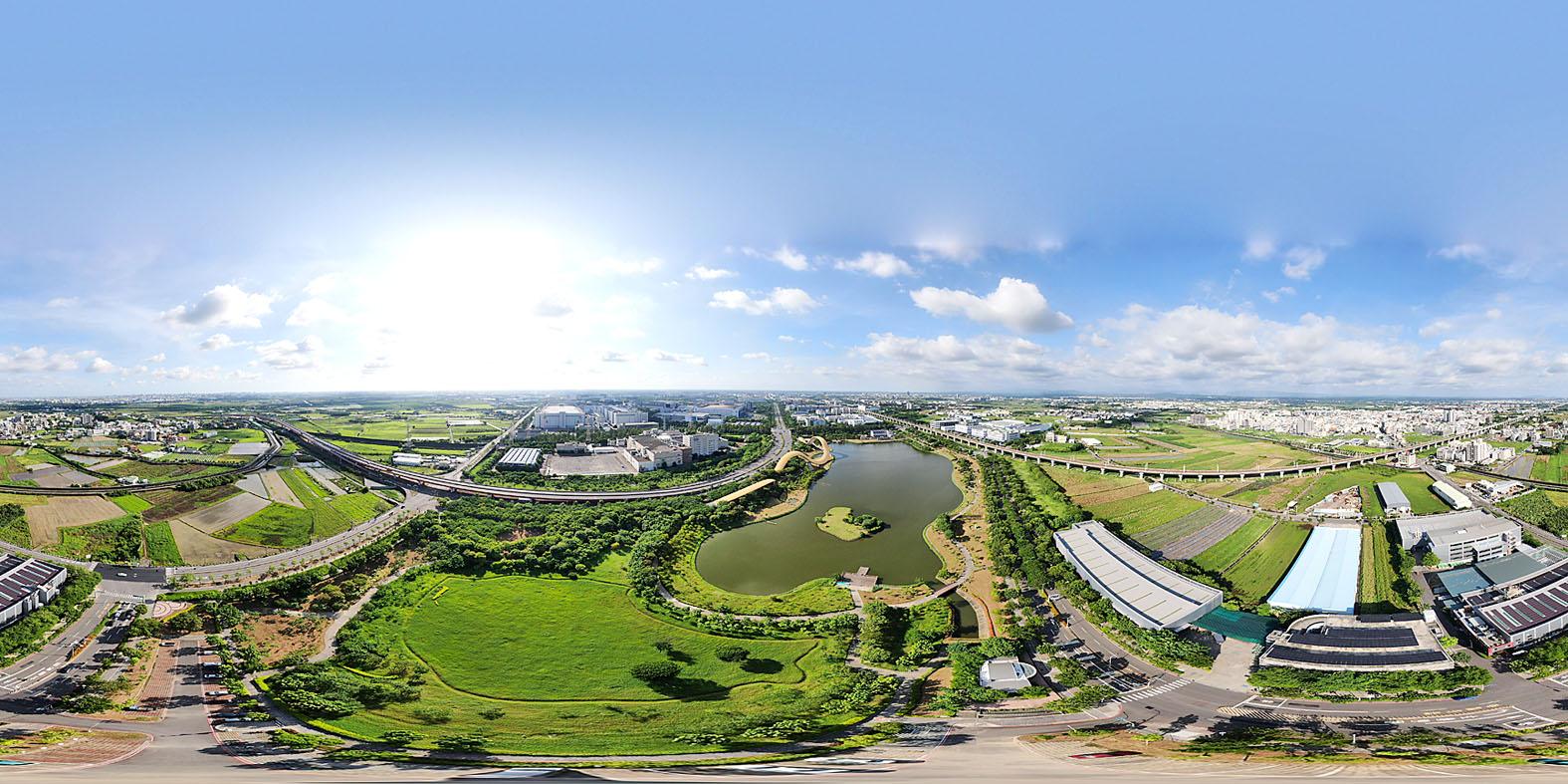More than 600 hectares have been allocated to creating science parks over the past two years, which with water, power and talent would drive local economies and bolster the nation, Premier Su Tseng-chang (蘇貞昌) said on Thursday.
Su was quoted by Executive Yuan spokesman Lo Ping-cheng (羅秉成) as making the remarks after the Ministry of Science and Technology reported on the nation’s development of science parks at a weekly Cabinet meeting.
Recent US-China trade conflicts have allowed the government to lure Taiwanese investors and money back from China through the “five plus two” innovative industries plan, Su said.

Photo courtesy of the Tainan City Government
The policy refers to seven development projects proposed by the government to transform the nation’s economic and industrial structure, including a plan to create an “Asian Silicon Valley,” and development in biotechnology, “green” energy, smart machinery, national defense, innovative agriculture and the circular economy.
Taiwan’s COVID-19 pandemic prevention efforts have allowed the nation to maintain normal production levels and satisfy global supply chain needs, Su said, adding that the pandemic has also spurred science parks to lean into digital technology.
Science parks’ total profits exceeded NT$3 trillion (US$107.04 billion) last year, while the revenue during the first half of this year has grown by 25 percent, compared with a year earlier, Su said.
Referring to planned science parks in Chiayi and Pingtung counties announced in December last year and January, Su said those facilities combined with the Hsinchu Science Park, Kaohsiung’s Ciaotou Science Park, the Southern Taiwan Science Park, the Chiayi Science Park and the Pingtung Science Park would form a “tech corridor” on the nation’s west coast.
Su instructed the ministry to observe deadlines for the establishment of the new science parks so that companies can move in on time.
He also called on agencies to work together to expedite the development of science parks and improving the ties of science parks with local communities, adding that facilities for everyday life should be planned and built so that park employees would have everything they need.
Science parks are at the center of the nation’s industrial and innovative research and development, and are one of the six core strategic industries, he said, adding that the government’s foresight in providing companies with the necessities to grow Taiwan’s technology sector would drive local economies and in turn Taiwan.

RESOLUTIONS DEBATE: Taiwan’s allies said that UN and WHA resolutions cited by China and other nations ‘do not determine Taiwan’s participation in WHO activities’ A proposal to invite Taiwan to this year’s World Health Assembly (WHA) was rejected on Monday, resulting in Taipei’s absence from the annual meeting for a ninth consecutive year, although partners spoke up for Taiwan’s participation at the first day of the meeting. The first agenda item after the opening was a “two-on-two debate” on a proposal to invite Taiwan to participate at the WHA as an observer. Similar to previous years, two countries made statements in favor of the proposal, while two others expressed their opposition. Philippine Secretary of Health Teodoro Herbosa, president of the 78th WHA, accepted the WHA General Committee’s

Palauan President Surangel Whipps Jr arrived in Taiwan last night to kick off his first visit to the country since beginning his second term earlier this year. After arriving at Taoyuan International Airport at around 6:30 pm, Whipps and his delegation were welcomed by Minister of Foreign Affairs Lin Chia-lung (林佳龍). Speaking to gathered media, the Palauan leader said he was excited and honored to be back in Taiwan on his first state visit to Taiwan since he was sworn in this January. Among those traveling with Whipps is Minister of State Gustav N. Aitaro, Public Infrastructure

Premier Cho Jung-tai (卓榮泰) on Friday laid out the Cabinet’s updated policy agenda and recapped the government’s achievements ahead of the one-year anniversary of President William Lai’s (賴清德) inauguration. Cho said the government had made progress across a range of areas, including rebuilding Hualien, cracking down on fraud, improving pedestrian safety and promoting economic growth. “I hope the public will not have the impression that the Cabinet only asked the legislature to reconsider a bunch of legal amendments,” Cho said, calling the moves “necessary” to protect constitutional governance and the public’s interest. The Cabinet would work toward achieving its “1+7” plan, he said. The

Nvidia founder and CEO Jensen Huang (黃仁勳) hosted a dinner in Taipei last night with key Taiwanese suppliers to celebrate the successful mass production of the company’s new Blackwell AI systems. Speaking to the media earlier yesterday, Huang thanked Nvidia’s Taiwanese partners for their contributions to the company’s ecosystem, while also sharing his plans to meet with Taiwan Semiconductor Manufacturing Co (TSMC) founder Morris Chang (張忠謀). In response to rumors that Nvidia will launch a downgraded Hopper H20 chip for China in July, Huang dismissed the reports, saying, “That is not true.” He clarified that there